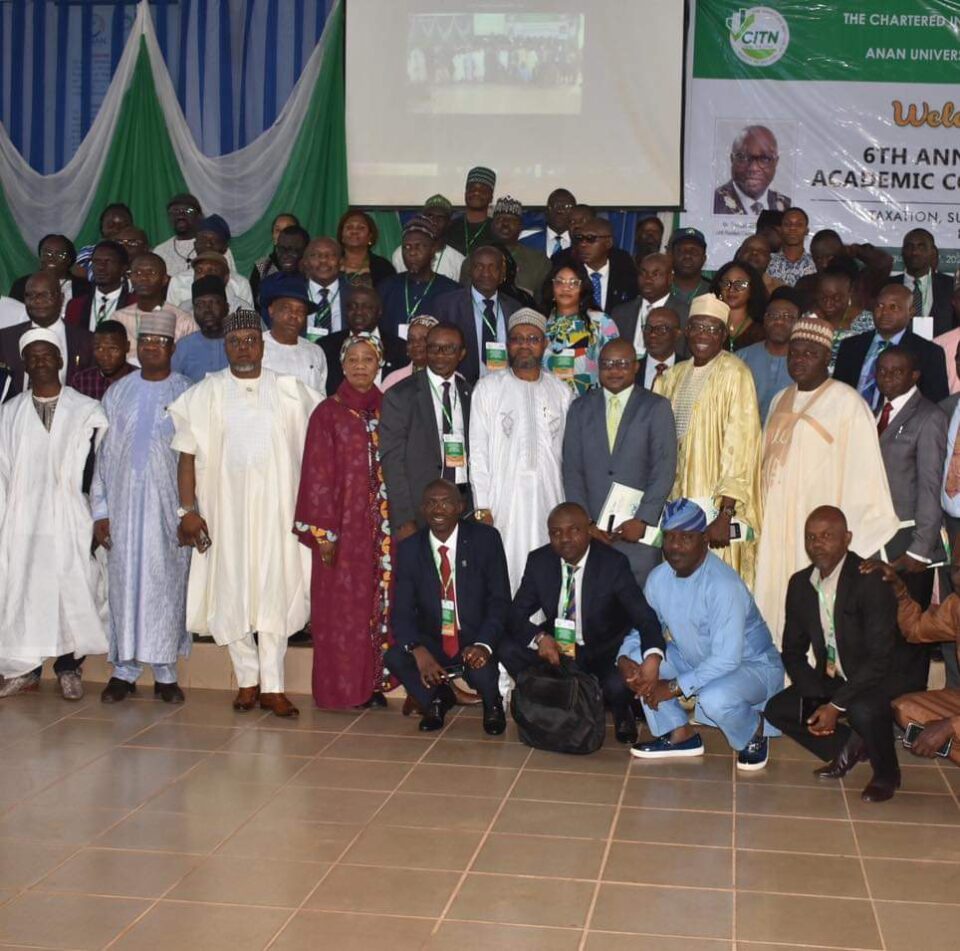Chuks Oyema-Aziken
Academia, tax practitioners, policymakers, experts and stakeholders have harped on innovative and prudent governance driven by effective and efficient tax administration in the sustainable financing of development goals, including those of the SDGs.
They stated this at the 6th Annual International Academic Conference on Taxation of the Chartered Institute of Taxation of Nigeria (CITN) in collaboration with ANAN University, Kwall, Plateau.
The 3 days Conference in Jos had as theme “Taxation, Sustainable Public Finance, and Development Goals”.
In his remarks at the opening ceremony, President, CITN, Mr Samuel Agbeluyi, FCTI, said the Conference of the CITN is organised annually to harmonise the perspectives of the ‘Town’ and ‘Gown’ on taxation and fiscal policy in Nigeria.
He said, “The theme of this conference “Taxation, Sustainable Public Finance, and Development Goals” underscores the profound impact of taxation on our societies. Profoundly, taxation remains the lifeblood of any nation’s economic growth and development. It not only provides the necessary resources for governments to deliver essential public services but also plays a pivotal role in shaping economic behavior, promoting wealth redistribution, and achieving sustainable development objectives.
“In Nigeria, however, the current socio-economic realities militate against the attainment of these lofty aspirations. As you know, government’s expenditure has continuously grown above her revenue base, thereby impeding capital formation. The response of government in this regard has always been continuous borrowing for spending which has over the years accumulated into high debt burdens for the country. I am also not unaware of the rising trust deficit between the citizens and the government and its negative impact on tax compliance.
“While the issues are enormous, one unanimous perspective popular among tax practitioners and members of the Academia is that, sustainable financing of development goals, including those of the SDGs, requires innovative and prudent governance driven by effective and efficient tax administration.
In his keynote address, Vice-Chancellor, ANAN University, Professor Musa Inuwa Fodio, ACTI noted the multifaceted global problems ranging from poverty, inequality, resource depletion to climate change.
He advised developing nations to adopt modern tax systems that focus on the optimization of tax revenues through voluntary compliance with tax laws, and minimization of tax burden on tax payers.
“There is the need for governments to adopt fair and equitable tax systems if they must balance their goals of increasing tax revenues, minimizing tax compliance costs, and promoting sustainable growth.
“Undoubtedly, taxation and finance have a pivotal role to play in the realization of the SDGs. First robust and effective tax systems generate revenue used by government in allocating resources to key priority areas such as healthcare, education, infrastructure and social welfare programs. Implementation of fair and transparent tax policies can ensure equitable distribution of wealth and resources.
“In addition, taxation can serve as an incentive for sustainable practices and behaviors by ensuring that environmental considerations are incorporated into tax frameworks, known as green taxation, to encourage businesses and individuals to adopt environmentally friendly practices, reduce carbon emissions, and promote transition to a low-carbon economy. These practices not only protect the planet for future generations but also creates new environment for sustainable economic growth.
“Furthermore, taxation can promote international cooperation and synergy towards addressing global tax challenges. With the world fast turning into a global village where capital flows transcend boarders effortlessly, there is an increasing need to establish a fair and more effective mechanisms to deal with tax evasion, profit shifting and base erosion by multinational companies. Nations will need enhanced and sustained collaboration to ensure that multinational corporations contribute their share of taxes in supporting global sustainable development initiatives.
Earlier, the Chairman, Conference Committee, Prof. S. A. S. Aruwa FCTI in his welcome address said the theme for the conference was carefully chosen to reflect current happening in the global economy and Nigeria.
“Every government today is concerned about how to attain efficiency in taxation, sustainable public finance, and attainment of sustainable development goals,” he said.



